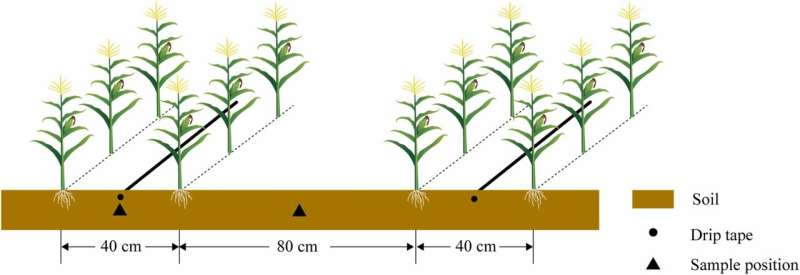New water-fertilizer strategy to achieve high yield of maize and resource use efficiency simultaneously

Water scarcity and low soil fertility are the main factors limiting crop production in semi-arid regions. One the other hand, excessive water resource input and large amount of fertilizer application not only lead to low water productivity and nitrogen use efficiency, but also produce a series of environmental problems and affect the structure and function of farmland ecosystem.
Previous studies have shown that organic fertilizer and bio-fertilizer provide sustainable agronomic approach to crop productivity by improving the soil quality. However, the direct mechanisms as well as the coupling effects of integrated fertilization measures with irrigation on maize growth are not fully understood.
A research team led by Prof. Zhang Tonghui from the Northwest Institute of Eco-Environment and Resources of the Chinese Academy of Sciences has proposed an eco-friendly strategy to improve resource use efficiency and crop productivity synergistically in Horqin Sandy Land. This study was published in .
Researchers investigated effects of different water and fertilizer treatments on maize growth, crop yield, water productivity, nitrogen use efficiency and economic benefit by setting different irrigation and fertilization treatments.
They found that integrated application of biofertilizer, chemical and organic fertilizer under moderate deficit irrigation could improve the growth of maize in later growth stage.
In addition, the researchers found that higher post-silking nitrogen uptake likely contributed to higher grain yield, integrated fertilization measures increased the post-silking nitrogen uptake and the percentage in total nitrogen content, finally increased the grain yield.
Moreover, they found that fertilization measures under moderate deficit irrigation could optimize the periodical evapotranspiration of maize, improve crop water productivity, nitrogen use efficiency and exhibit the highest net profit.
"This study provides a new water-fertilizer strategy in local maize production, as well as theoretical basis for rational water and fertilization management," said Prof. Zhang.
More information: Ning Wang et al, Integrated application of fertilization and reduced irrigation improved maize (Zea mays L.) yield, crop water productivity and nitrogen use efficiency in a semi-arid region, Agricultural Water Management (2023).
Provided by Chinese Academy of Sciences



















